Reflective Essay: Learning Outcomes from MBA Capstone Course
VerifiedAdded on 2023/03/31
|13
|2900
|345
Essay
AI Summary
This reflective essay examines the learning outcomes of an MBA Capstone course, focusing on the development of a strategic mindset and the acquisition of essential skills. The essay delves into the "knowing, being, and doing" framework and the four key capstone skills: theoretical, applied, practical, and reflective. It analyzes the learning derived from the capstone project and consultancy research, highlighting the integration of theoretical knowledge with real-world business scenarios. The author reflects on the advantages gained from the MBA program, emphasizing improvements in communication, strategic management, and networking skills. Furthermore, the essay explores the impact of the course on future career endeavors, showcasing how the acquired skills will contribute to professional advancement and effective problem-solving in the workplace. The essay also covers the development of critical thinking and the ability to analyze business issues from multiple perspectives.

Running Head: 600 2
600 2
Student’s Name
University Name
Author’s Note
600 2
Student’s Name
University Name
Author’s Note
Paraphrase This Document
Need a fresh take? Get an instant paraphrase of this document with our AI Paraphraser
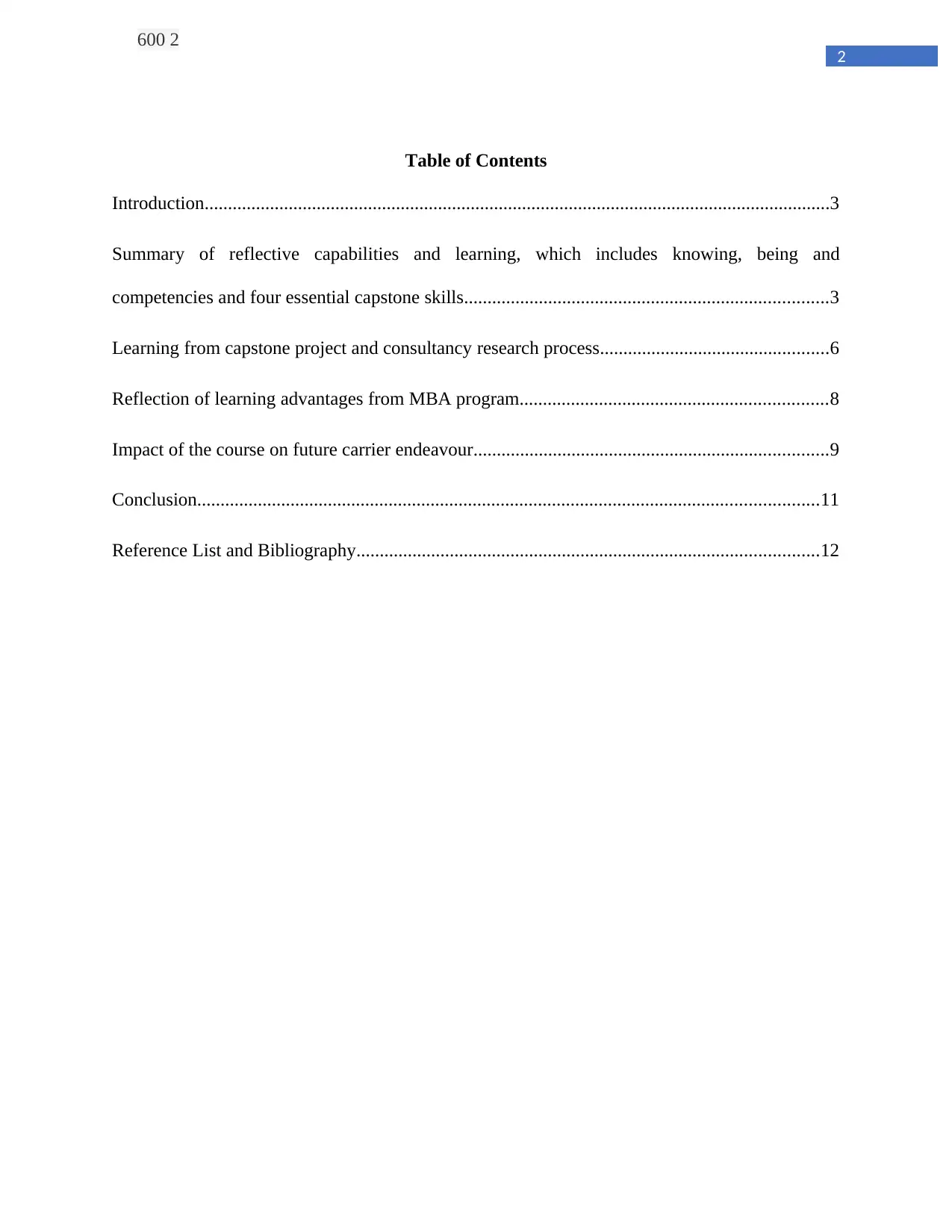
2
600 2
Table of Contents
Introduction......................................................................................................................................3
Summary of reflective capabilities and learning, which includes knowing, being and
competencies and four essential capstone skills..............................................................................3
Learning from capstone project and consultancy research process.................................................6
Reflection of learning advantages from MBA program..................................................................8
Impact of the course on future carrier endeavour............................................................................9
Conclusion.....................................................................................................................................11
Reference List and Bibliography...................................................................................................12
600 2
Table of Contents
Introduction......................................................................................................................................3
Summary of reflective capabilities and learning, which includes knowing, being and
competencies and four essential capstone skills..............................................................................3
Learning from capstone project and consultancy research process.................................................6
Reflection of learning advantages from MBA program..................................................................8
Impact of the course on future carrier endeavour............................................................................9
Conclusion.....................................................................................................................................11
Reference List and Bibliography...................................................................................................12
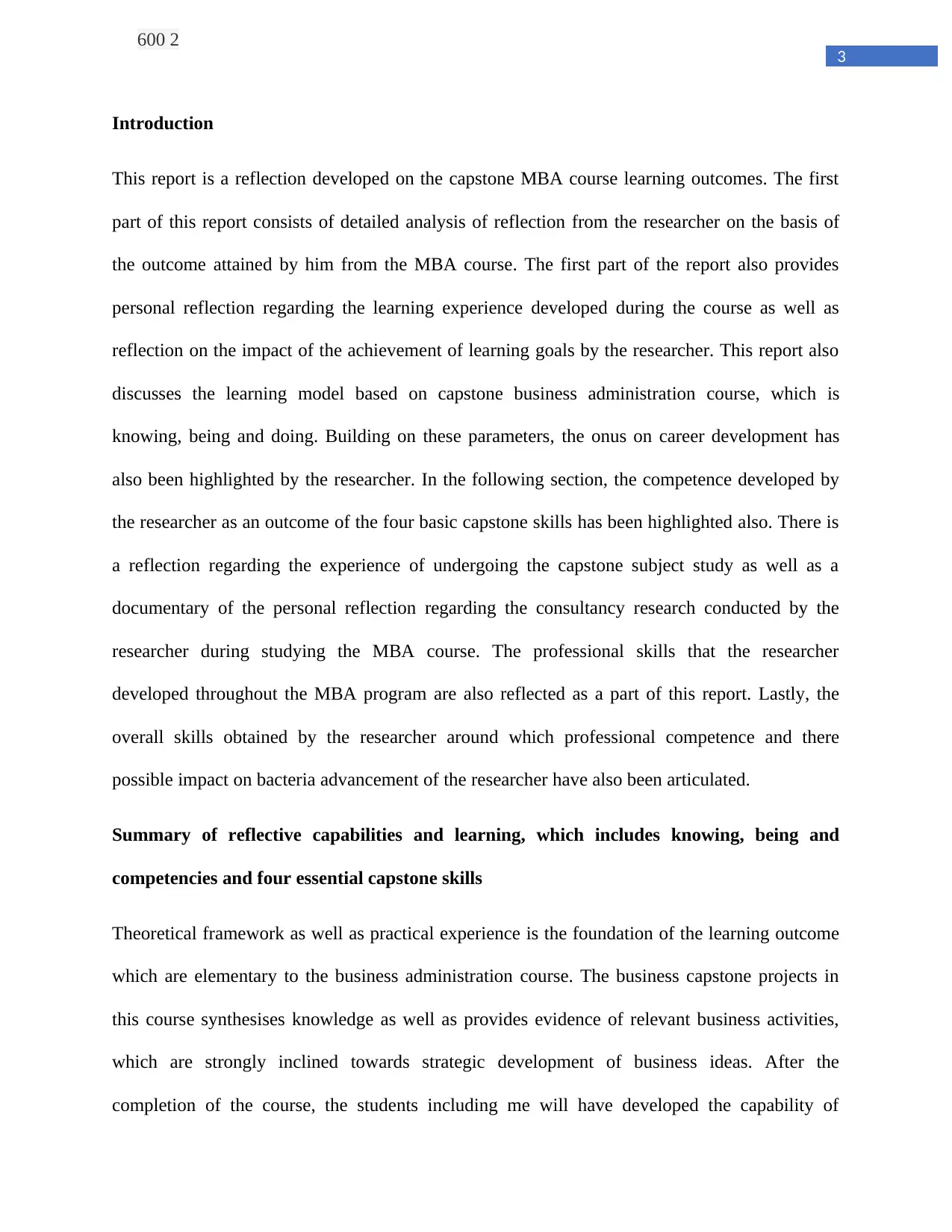
3
600 2
Introduction
This report is a reflection developed on the capstone MBA course learning outcomes. The first
part of this report consists of detailed analysis of reflection from the researcher on the basis of
the outcome attained by him from the MBA course. The first part of the report also provides
personal reflection regarding the learning experience developed during the course as well as
reflection on the impact of the achievement of learning goals by the researcher. This report also
discusses the learning model based on capstone business administration course, which is
knowing, being and doing. Building on these parameters, the onus on career development has
also been highlighted by the researcher. In the following section, the competence developed by
the researcher as an outcome of the four basic capstone skills has been highlighted also. There is
a reflection regarding the experience of undergoing the capstone subject study as well as a
documentary of the personal reflection regarding the consultancy research conducted by the
researcher during studying the MBA course. The professional skills that the researcher
developed throughout the MBA program are also reflected as a part of this report. Lastly, the
overall skills obtained by the researcher around which professional competence and there
possible impact on bacteria advancement of the researcher have also been articulated.
Summary of reflective capabilities and learning, which includes knowing, being and
competencies and four essential capstone skills
Theoretical framework as well as practical experience is the foundation of the learning outcome
which are elementary to the business administration course. The business capstone projects in
this course synthesises knowledge as well as provides evidence of relevant business activities,
which are strongly inclined towards strategic development of business ideas. After the
completion of the course, the students including me will have developed the capability of
600 2
Introduction
This report is a reflection developed on the capstone MBA course learning outcomes. The first
part of this report consists of detailed analysis of reflection from the researcher on the basis of
the outcome attained by him from the MBA course. The first part of the report also provides
personal reflection regarding the learning experience developed during the course as well as
reflection on the impact of the achievement of learning goals by the researcher. This report also
discusses the learning model based on capstone business administration course, which is
knowing, being and doing. Building on these parameters, the onus on career development has
also been highlighted by the researcher. In the following section, the competence developed by
the researcher as an outcome of the four basic capstone skills has been highlighted also. There is
a reflection regarding the experience of undergoing the capstone subject study as well as a
documentary of the personal reflection regarding the consultancy research conducted by the
researcher during studying the MBA course. The professional skills that the researcher
developed throughout the MBA program are also reflected as a part of this report. Lastly, the
overall skills obtained by the researcher around which professional competence and there
possible impact on bacteria advancement of the researcher have also been articulated.
Summary of reflective capabilities and learning, which includes knowing, being and
competencies and four essential capstone skills
Theoretical framework as well as practical experience is the foundation of the learning outcome
which are elementary to the business administration course. The business capstone projects in
this course synthesises knowledge as well as provides evidence of relevant business activities,
which are strongly inclined towards strategic development of business ideas. After the
completion of the course, the students including me will have developed the capability of
⊘ This is a preview!⊘
Do you want full access?
Subscribe today to unlock all pages.

Trusted by 1+ million students worldwide
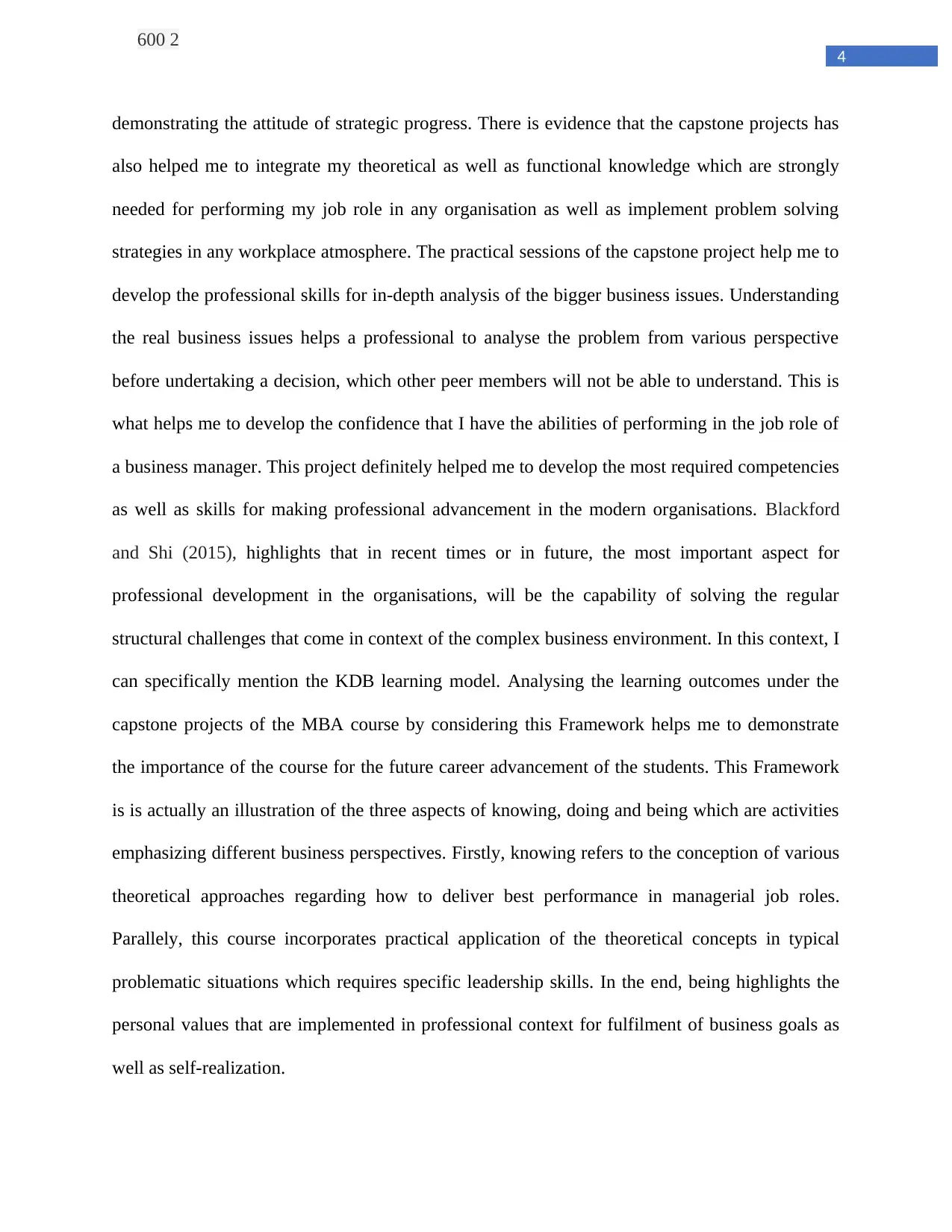
4
600 2
demonstrating the attitude of strategic progress. There is evidence that the capstone projects has
also helped me to integrate my theoretical as well as functional knowledge which are strongly
needed for performing my job role in any organisation as well as implement problem solving
strategies in any workplace atmosphere. The practical sessions of the capstone project help me to
develop the professional skills for in-depth analysis of the bigger business issues. Understanding
the real business issues helps a professional to analyse the problem from various perspective
before undertaking a decision, which other peer members will not be able to understand. This is
what helps me to develop the confidence that I have the abilities of performing in the job role of
a business manager. This project definitely helped me to develop the most required competencies
as well as skills for making professional advancement in the modern organisations. Blackford
and Shi (2015), highlights that in recent times or in future, the most important aspect for
professional development in the organisations, will be the capability of solving the regular
structural challenges that come in context of the complex business environment. In this context, I
can specifically mention the KDB learning model. Analysing the learning outcomes under the
capstone projects of the MBA course by considering this Framework helps me to demonstrate
the importance of the course for the future career advancement of the students. This Framework
is is actually an illustration of the three aspects of knowing, doing and being which are activities
emphasizing different business perspectives. Firstly, knowing refers to the conception of various
theoretical approaches regarding how to deliver best performance in managerial job roles.
Parallely, this course incorporates practical application of the theoretical concepts in typical
problematic situations which requires specific leadership skills. In the end, being highlights the
personal values that are implemented in professional context for fulfilment of business goals as
well as self-realization.
600 2
demonstrating the attitude of strategic progress. There is evidence that the capstone projects has
also helped me to integrate my theoretical as well as functional knowledge which are strongly
needed for performing my job role in any organisation as well as implement problem solving
strategies in any workplace atmosphere. The practical sessions of the capstone project help me to
develop the professional skills for in-depth analysis of the bigger business issues. Understanding
the real business issues helps a professional to analyse the problem from various perspective
before undertaking a decision, which other peer members will not be able to understand. This is
what helps me to develop the confidence that I have the abilities of performing in the job role of
a business manager. This project definitely helped me to develop the most required competencies
as well as skills for making professional advancement in the modern organisations. Blackford
and Shi (2015), highlights that in recent times or in future, the most important aspect for
professional development in the organisations, will be the capability of solving the regular
structural challenges that come in context of the complex business environment. In this context, I
can specifically mention the KDB learning model. Analysing the learning outcomes under the
capstone projects of the MBA course by considering this Framework helps me to demonstrate
the importance of the course for the future career advancement of the students. This Framework
is is actually an illustration of the three aspects of knowing, doing and being which are activities
emphasizing different business perspectives. Firstly, knowing refers to the conception of various
theoretical approaches regarding how to deliver best performance in managerial job roles.
Parallely, this course incorporates practical application of the theoretical concepts in typical
problematic situations which requires specific leadership skills. In the end, being highlights the
personal values that are implemented in professional context for fulfilment of business goals as
well as self-realization.
Paraphrase This Document
Need a fresh take? Get an instant paraphrase of this document with our AI Paraphraser
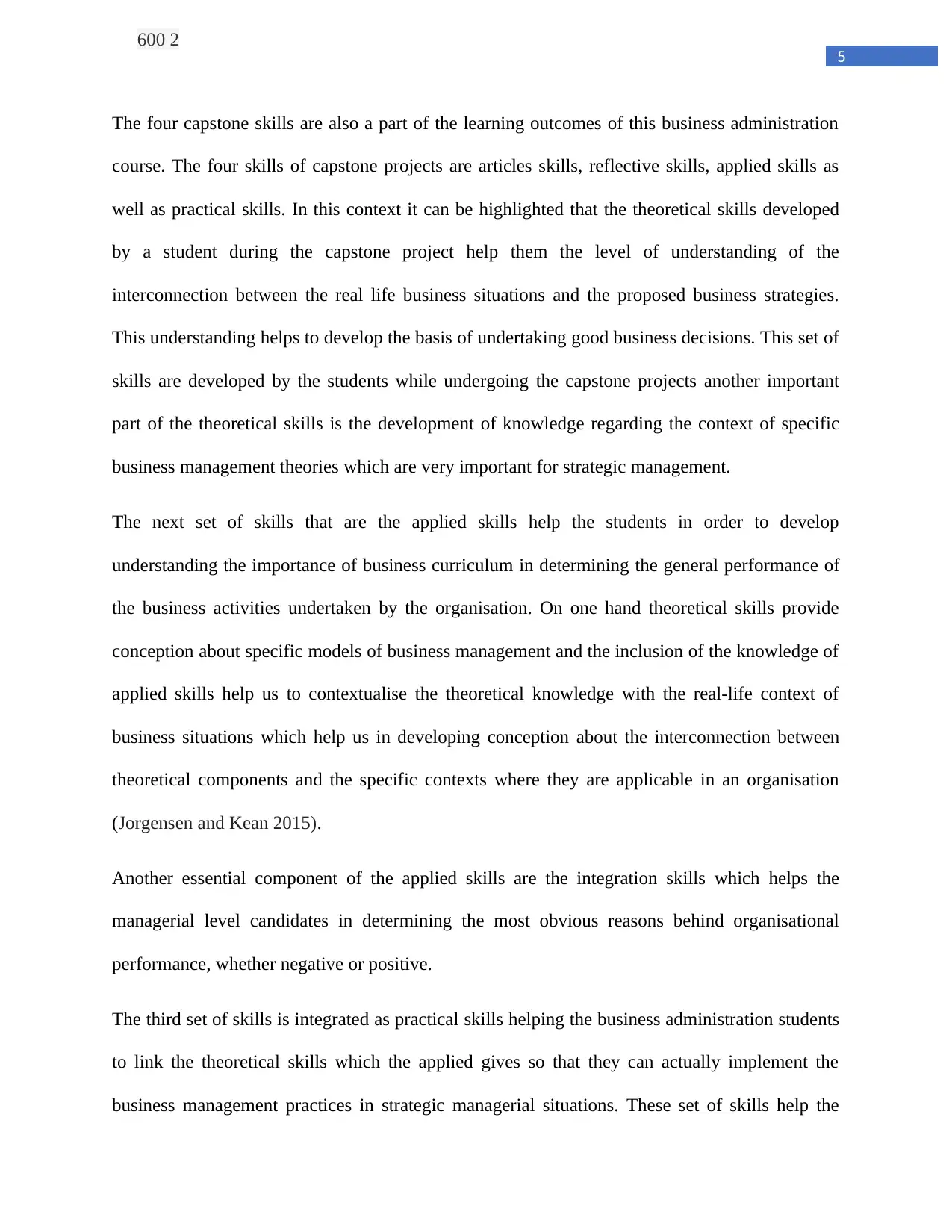
5
600 2
The four capstone skills are also a part of the learning outcomes of this business administration
course. The four skills of capstone projects are articles skills, reflective skills, applied skills as
well as practical skills. In this context it can be highlighted that the theoretical skills developed
by a student during the capstone project help them the level of understanding of the
interconnection between the real life business situations and the proposed business strategies.
This understanding helps to develop the basis of undertaking good business decisions. This set of
skills are developed by the students while undergoing the capstone projects another important
part of the theoretical skills is the development of knowledge regarding the context of specific
business management theories which are very important for strategic management.
The next set of skills that are the applied skills help the students in order to develop
understanding the importance of business curriculum in determining the general performance of
the business activities undertaken by the organisation. On one hand theoretical skills provide
conception about specific models of business management and the inclusion of the knowledge of
applied skills help us to contextualise the theoretical knowledge with the real-life context of
business situations which help us in developing conception about the interconnection between
theoretical components and the specific contexts where they are applicable in an organisation
(Jorgensen and Kean 2015).
Another essential component of the applied skills are the integration skills which helps the
managerial level candidates in determining the most obvious reasons behind organisational
performance, whether negative or positive.
The third set of skills is integrated as practical skills helping the business administration students
to link the theoretical skills which the applied gives so that they can actually implement the
business management practices in strategic managerial situations. These set of skills help the
600 2
The four capstone skills are also a part of the learning outcomes of this business administration
course. The four skills of capstone projects are articles skills, reflective skills, applied skills as
well as practical skills. In this context it can be highlighted that the theoretical skills developed
by a student during the capstone project help them the level of understanding of the
interconnection between the real life business situations and the proposed business strategies.
This understanding helps to develop the basis of undertaking good business decisions. This set of
skills are developed by the students while undergoing the capstone projects another important
part of the theoretical skills is the development of knowledge regarding the context of specific
business management theories which are very important for strategic management.
The next set of skills that are the applied skills help the students in order to develop
understanding the importance of business curriculum in determining the general performance of
the business activities undertaken by the organisation. On one hand theoretical skills provide
conception about specific models of business management and the inclusion of the knowledge of
applied skills help us to contextualise the theoretical knowledge with the real-life context of
business situations which help us in developing conception about the interconnection between
theoretical components and the specific contexts where they are applicable in an organisation
(Jorgensen and Kean 2015).
Another essential component of the applied skills are the integration skills which helps the
managerial level candidates in determining the most obvious reasons behind organisational
performance, whether negative or positive.
The third set of skills is integrated as practical skills helping the business administration students
to link the theoretical skills which the applied gives so that they can actually implement the
business management practices in strategic managerial situations. These set of skills help the
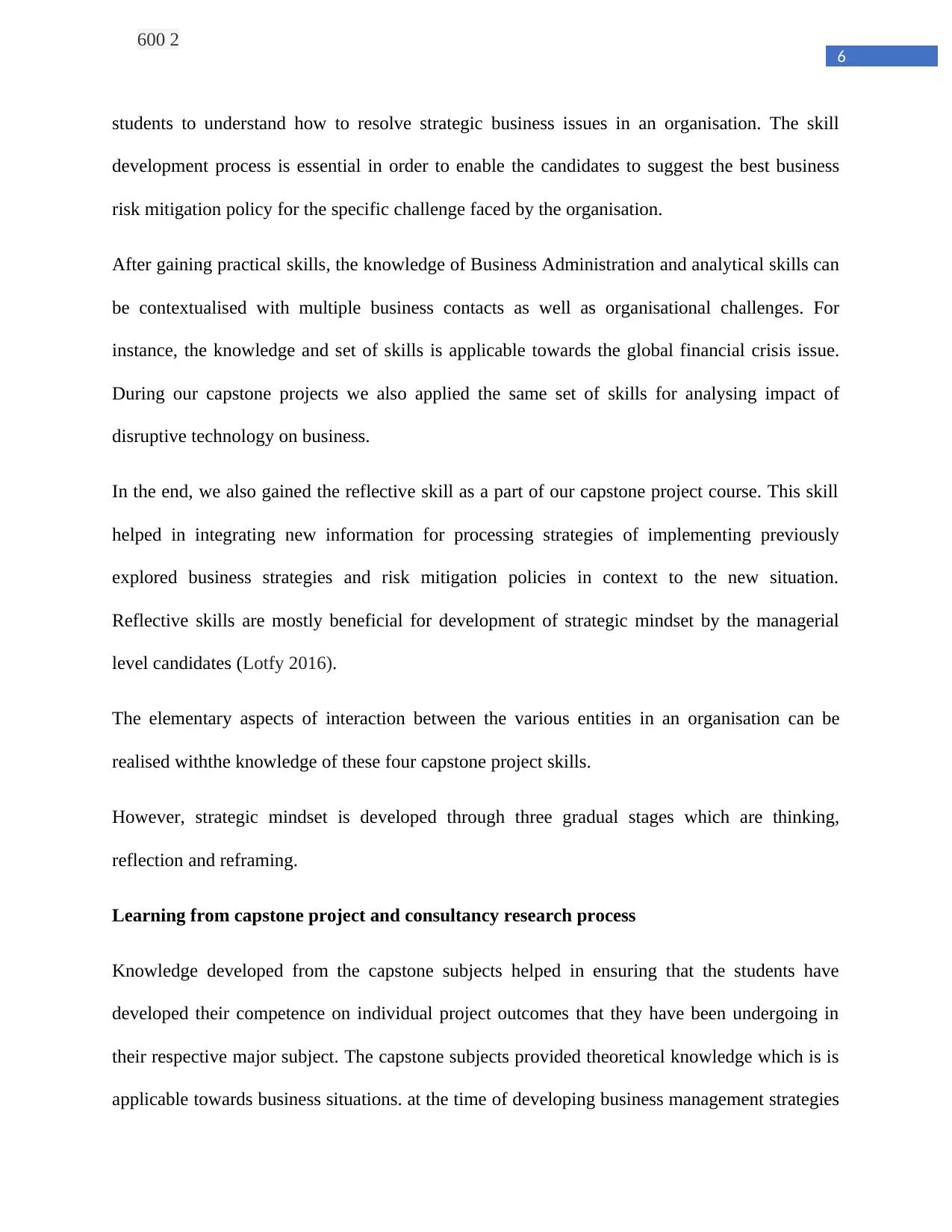
6
600 2
students to understand how to resolve strategic business issues in an organisation. The skill
development process is essential in order to enable the candidates to suggest the best business
risk mitigation policy for the specific challenge faced by the organisation.
After gaining practical skills, the knowledge of Business Administration and analytical skills can
be contextualised with multiple business contacts as well as organisational challenges. For
instance, the knowledge and set of skills is applicable towards the global financial crisis issue.
During our capstone projects we also applied the same set of skills for analysing impact of
disruptive technology on business.
In the end, we also gained the reflective skill as a part of our capstone project course. This skill
helped in integrating new information for processing strategies of implementing previously
explored business strategies and risk mitigation policies in context to the new situation.
Reflective skills are mostly beneficial for development of strategic mindset by the managerial
level candidates (Lotfy 2016).
The elementary aspects of interaction between the various entities in an organisation can be
realised withthe knowledge of these four capstone project skills.
However, strategic mindset is developed through three gradual stages which are thinking,
reflection and reframing.
Learning from capstone project and consultancy research process
Knowledge developed from the capstone subjects helped in ensuring that the students have
developed their competence on individual project outcomes that they have been undergoing in
their respective major subject. The capstone subjects provided theoretical knowledge which is is
applicable towards business situations. at the time of developing business management strategies
600 2
students to understand how to resolve strategic business issues in an organisation. The skill
development process is essential in order to enable the candidates to suggest the best business
risk mitigation policy for the specific challenge faced by the organisation.
After gaining practical skills, the knowledge of Business Administration and analytical skills can
be contextualised with multiple business contacts as well as organisational challenges. For
instance, the knowledge and set of skills is applicable towards the global financial crisis issue.
During our capstone projects we also applied the same set of skills for analysing impact of
disruptive technology on business.
In the end, we also gained the reflective skill as a part of our capstone project course. This skill
helped in integrating new information for processing strategies of implementing previously
explored business strategies and risk mitigation policies in context to the new situation.
Reflective skills are mostly beneficial for development of strategic mindset by the managerial
level candidates (Lotfy 2016).
The elementary aspects of interaction between the various entities in an organisation can be
realised withthe knowledge of these four capstone project skills.
However, strategic mindset is developed through three gradual stages which are thinking,
reflection and reframing.
Learning from capstone project and consultancy research process
Knowledge developed from the capstone subjects helped in ensuring that the students have
developed their competence on individual project outcomes that they have been undergoing in
their respective major subject. The capstone subjects provided theoretical knowledge which is is
applicable towards business situations. at the time of developing business management strategies
⊘ This is a preview!⊘
Do you want full access?
Subscribe today to unlock all pages.

Trusted by 1+ million students worldwide
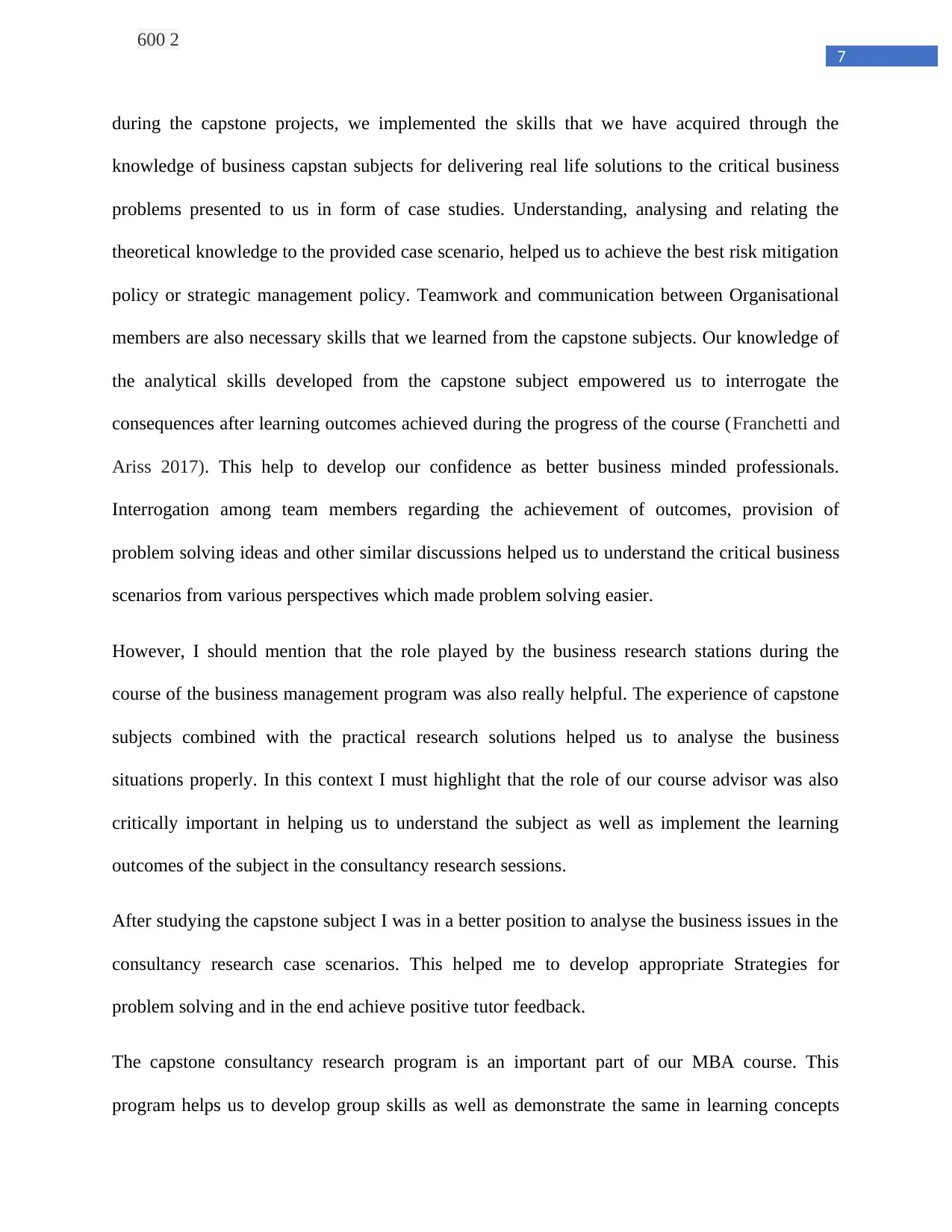
7
600 2
during the capstone projects, we implemented the skills that we have acquired through the
knowledge of business capstan subjects for delivering real life solutions to the critical business
problems presented to us in form of case studies. Understanding, analysing and relating the
theoretical knowledge to the provided case scenario, helped us to achieve the best risk mitigation
policy or strategic management policy. Teamwork and communication between Organisational
members are also necessary skills that we learned from the capstone subjects. Our knowledge of
the analytical skills developed from the capstone subject empowered us to interrogate the
consequences after learning outcomes achieved during the progress of the course (Franchetti and
Ariss 2017). This help to develop our confidence as better business minded professionals.
Interrogation among team members regarding the achievement of outcomes, provision of
problem solving ideas and other similar discussions helped us to understand the critical business
scenarios from various perspectives which made problem solving easier.
However, I should mention that the role played by the business research stations during the
course of the business management program was also really helpful. The experience of capstone
subjects combined with the practical research solutions helped us to analyse the business
situations properly. In this context I must highlight that the role of our course advisor was also
critically important in helping us to understand the subject as well as implement the learning
outcomes of the subject in the consultancy research sessions.
After studying the capstone subject I was in a better position to analyse the business issues in the
consultancy research case scenarios. This helped me to develop appropriate Strategies for
problem solving and in the end achieve positive tutor feedback.
The capstone consultancy research program is an important part of our MBA course. This
program helps us to develop group skills as well as demonstrate the same in learning concepts
600 2
during the capstone projects, we implemented the skills that we have acquired through the
knowledge of business capstan subjects for delivering real life solutions to the critical business
problems presented to us in form of case studies. Understanding, analysing and relating the
theoretical knowledge to the provided case scenario, helped us to achieve the best risk mitigation
policy or strategic management policy. Teamwork and communication between Organisational
members are also necessary skills that we learned from the capstone subjects. Our knowledge of
the analytical skills developed from the capstone subject empowered us to interrogate the
consequences after learning outcomes achieved during the progress of the course (Franchetti and
Ariss 2017). This help to develop our confidence as better business minded professionals.
Interrogation among team members regarding the achievement of outcomes, provision of
problem solving ideas and other similar discussions helped us to understand the critical business
scenarios from various perspectives which made problem solving easier.
However, I should mention that the role played by the business research stations during the
course of the business management program was also really helpful. The experience of capstone
subjects combined with the practical research solutions helped us to analyse the business
situations properly. In this context I must highlight that the role of our course advisor was also
critically important in helping us to understand the subject as well as implement the learning
outcomes of the subject in the consultancy research sessions.
After studying the capstone subject I was in a better position to analyse the business issues in the
consultancy research case scenarios. This helped me to develop appropriate Strategies for
problem solving and in the end achieve positive tutor feedback.
The capstone consultancy research program is an important part of our MBA course. This
program helps us to develop group skills as well as demonstrate the same in learning concepts
Paraphrase This Document
Need a fresh take? Get an instant paraphrase of this document with our AI Paraphraser
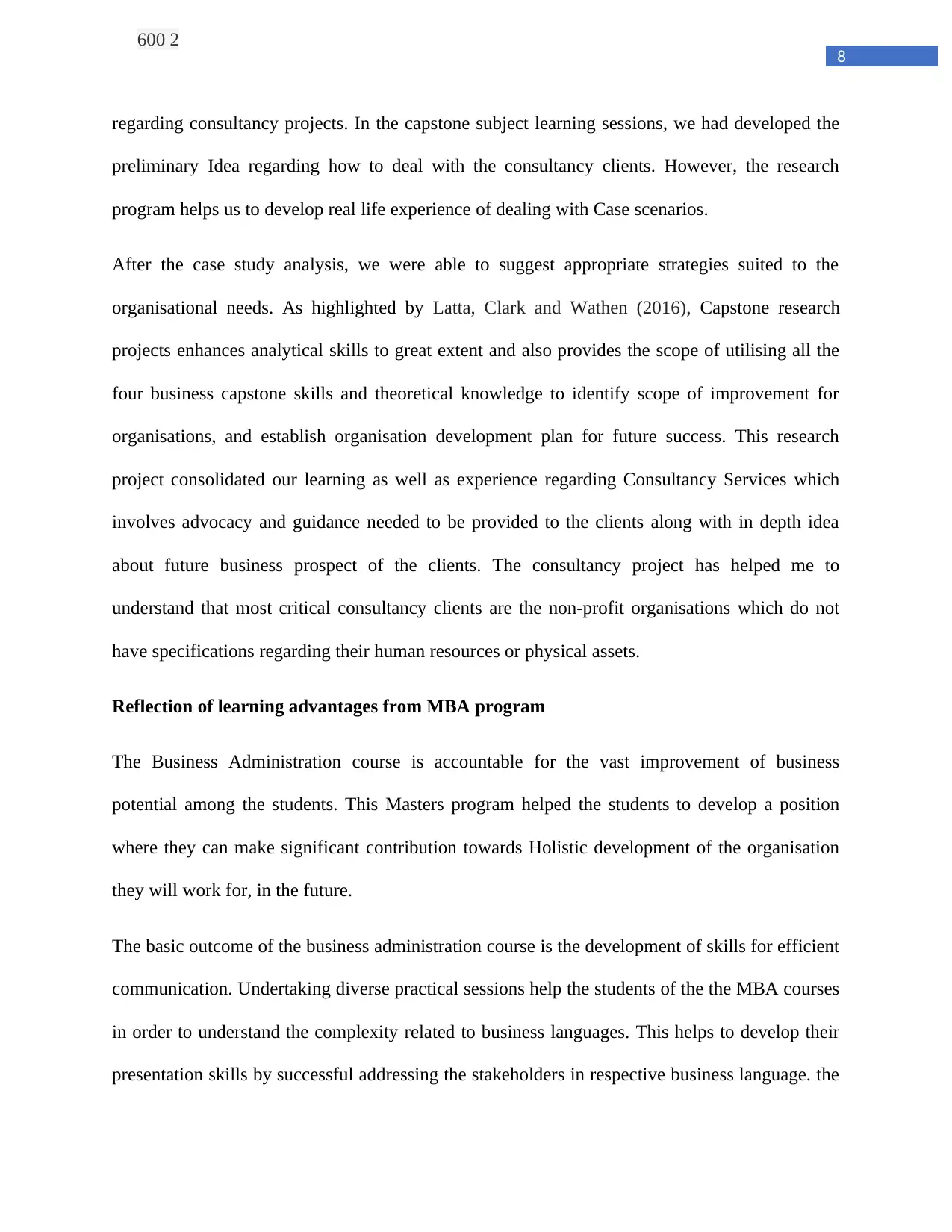
8
600 2
regarding consultancy projects. In the capstone subject learning sessions, we had developed the
preliminary Idea regarding how to deal with the consultancy clients. However, the research
program helps us to develop real life experience of dealing with Case scenarios.
After the case study analysis, we were able to suggest appropriate strategies suited to the
organisational needs. As highlighted by Latta, Clark and Wathen (2016), Capstone research
projects enhances analytical skills to great extent and also provides the scope of utilising all the
four business capstone skills and theoretical knowledge to identify scope of improvement for
organisations, and establish organisation development plan for future success. This research
project consolidated our learning as well as experience regarding Consultancy Services which
involves advocacy and guidance needed to be provided to the clients along with in depth idea
about future business prospect of the clients. The consultancy project has helped me to
understand that most critical consultancy clients are the non-profit organisations which do not
have specifications regarding their human resources or physical assets.
Reflection of learning advantages from MBA program
The Business Administration course is accountable for the vast improvement of business
potential among the students. This Masters program helped the students to develop a position
where they can make significant contribution towards Holistic development of the organisation
they will work for, in the future.
The basic outcome of the business administration course is the development of skills for efficient
communication. Undertaking diverse practical sessions help the students of the the MBA courses
in order to understand the complexity related to business languages. This helps to develop their
presentation skills by successful addressing the stakeholders in respective business language. the
600 2
regarding consultancy projects. In the capstone subject learning sessions, we had developed the
preliminary Idea regarding how to deal with the consultancy clients. However, the research
program helps us to develop real life experience of dealing with Case scenarios.
After the case study analysis, we were able to suggest appropriate strategies suited to the
organisational needs. As highlighted by Latta, Clark and Wathen (2016), Capstone research
projects enhances analytical skills to great extent and also provides the scope of utilising all the
four business capstone skills and theoretical knowledge to identify scope of improvement for
organisations, and establish organisation development plan for future success. This research
project consolidated our learning as well as experience regarding Consultancy Services which
involves advocacy and guidance needed to be provided to the clients along with in depth idea
about future business prospect of the clients. The consultancy project has helped me to
understand that most critical consultancy clients are the non-profit organisations which do not
have specifications regarding their human resources or physical assets.
Reflection of learning advantages from MBA program
The Business Administration course is accountable for the vast improvement of business
potential among the students. This Masters program helped the students to develop a position
where they can make significant contribution towards Holistic development of the organisation
they will work for, in the future.
The basic outcome of the business administration course is the development of skills for efficient
communication. Undertaking diverse practical sessions help the students of the the MBA courses
in order to understand the complexity related to business languages. This helps to develop their
presentation skills by successful addressing the stakeholders in respective business language. the
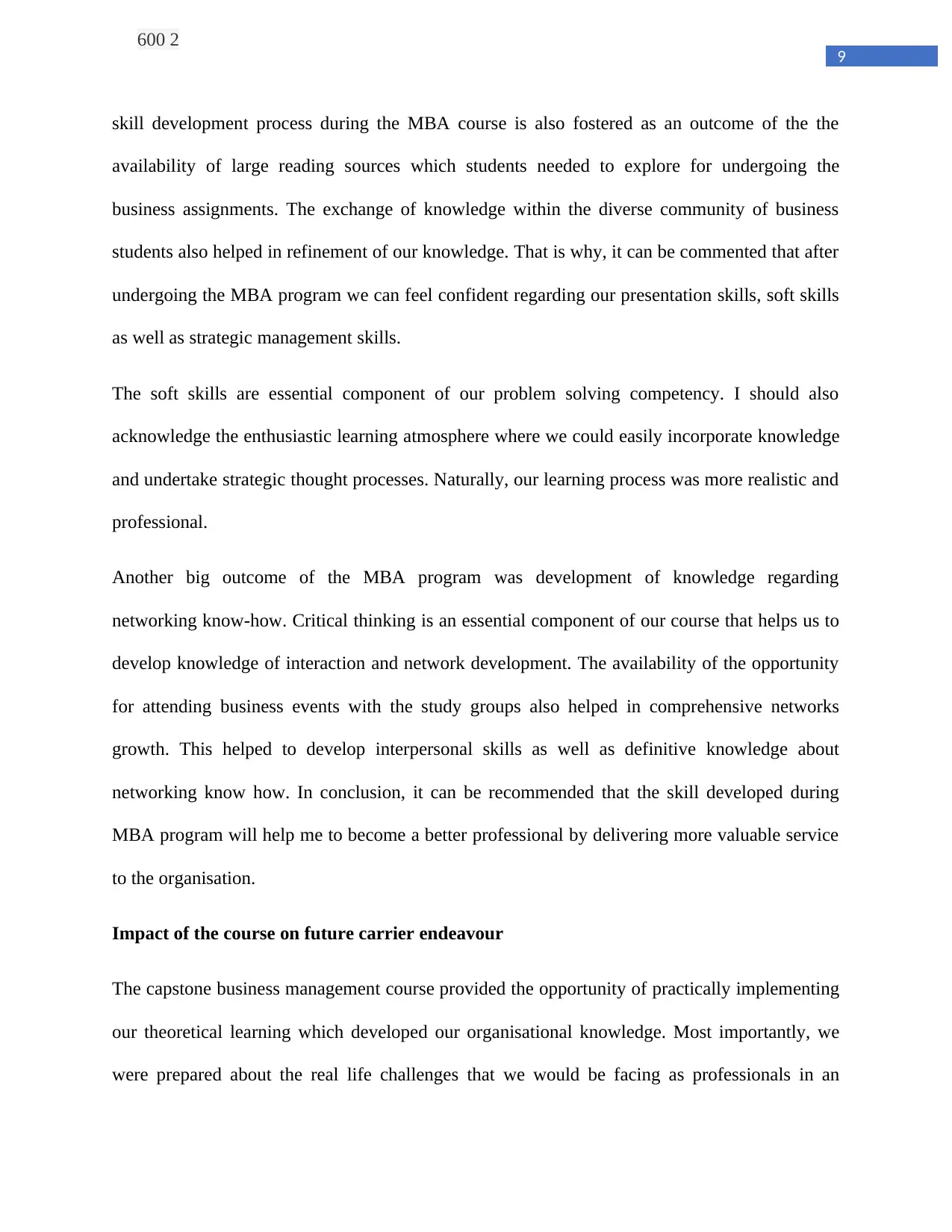
9
600 2
skill development process during the MBA course is also fostered as an outcome of the the
availability of large reading sources which students needed to explore for undergoing the
business assignments. The exchange of knowledge within the diverse community of business
students also helped in refinement of our knowledge. That is why, it can be commented that after
undergoing the MBA program we can feel confident regarding our presentation skills, soft skills
as well as strategic management skills.
The soft skills are essential component of our problem solving competency. I should also
acknowledge the enthusiastic learning atmosphere where we could easily incorporate knowledge
and undertake strategic thought processes. Naturally, our learning process was more realistic and
professional.
Another big outcome of the MBA program was development of knowledge regarding
networking know-how. Critical thinking is an essential component of our course that helps us to
develop knowledge of interaction and network development. The availability of the opportunity
for attending business events with the study groups also helped in comprehensive networks
growth. This helped to develop interpersonal skills as well as definitive knowledge about
networking know how. In conclusion, it can be recommended that the skill developed during
MBA program will help me to become a better professional by delivering more valuable service
to the organisation.
Impact of the course on future carrier endeavour
The capstone business management course provided the opportunity of practically implementing
our theoretical learning which developed our organisational knowledge. Most importantly, we
were prepared about the real life challenges that we would be facing as professionals in an
600 2
skill development process during the MBA course is also fostered as an outcome of the the
availability of large reading sources which students needed to explore for undergoing the
business assignments. The exchange of knowledge within the diverse community of business
students also helped in refinement of our knowledge. That is why, it can be commented that after
undergoing the MBA program we can feel confident regarding our presentation skills, soft skills
as well as strategic management skills.
The soft skills are essential component of our problem solving competency. I should also
acknowledge the enthusiastic learning atmosphere where we could easily incorporate knowledge
and undertake strategic thought processes. Naturally, our learning process was more realistic and
professional.
Another big outcome of the MBA program was development of knowledge regarding
networking know-how. Critical thinking is an essential component of our course that helps us to
develop knowledge of interaction and network development. The availability of the opportunity
for attending business events with the study groups also helped in comprehensive networks
growth. This helped to develop interpersonal skills as well as definitive knowledge about
networking know how. In conclusion, it can be recommended that the skill developed during
MBA program will help me to become a better professional by delivering more valuable service
to the organisation.
Impact of the course on future carrier endeavour
The capstone business management course provided the opportunity of practically implementing
our theoretical learning which developed our organisational knowledge. Most importantly, we
were prepared about the real life challenges that we would be facing as professionals in an
⊘ This is a preview!⊘
Do you want full access?
Subscribe today to unlock all pages.

Trusted by 1+ million students worldwide
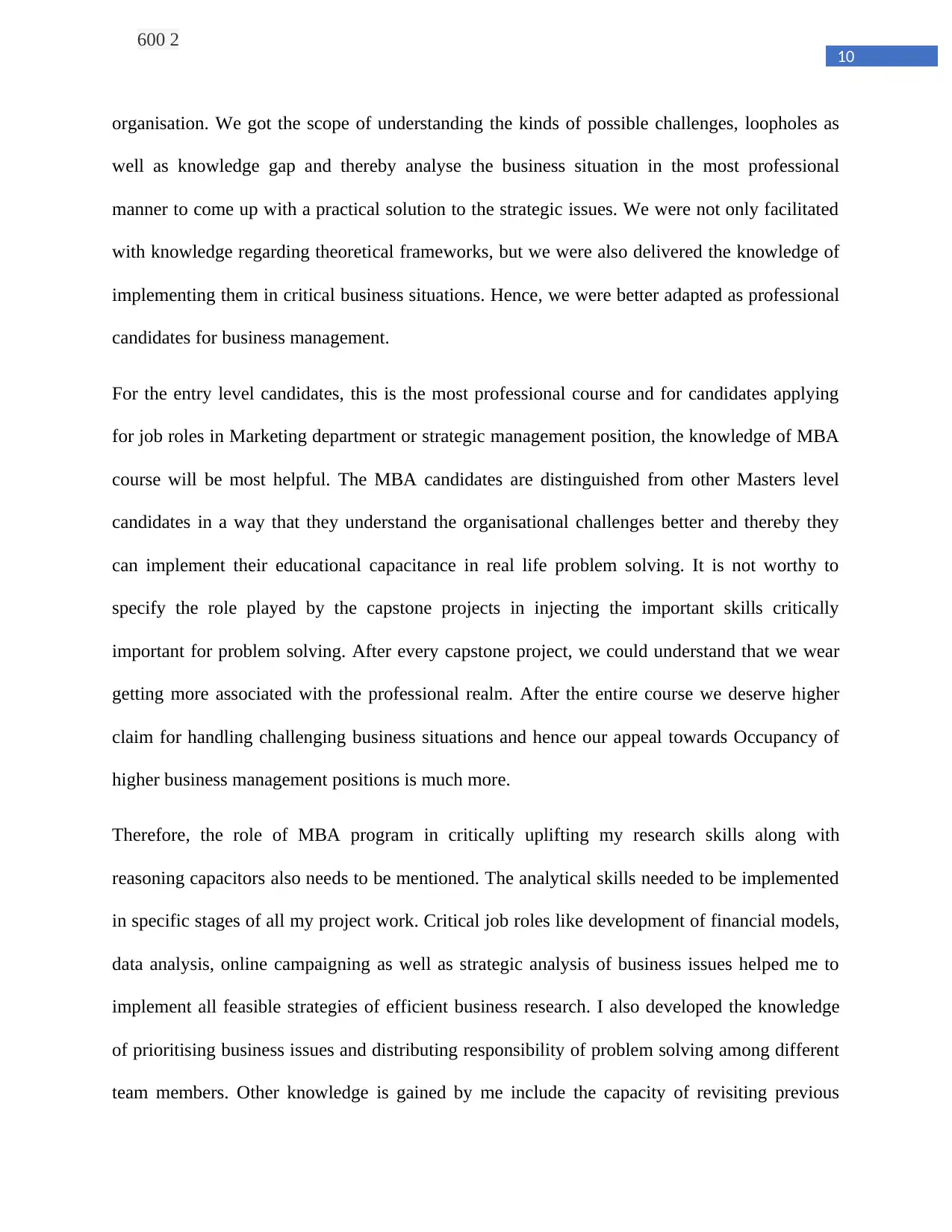
10
600 2
organisation. We got the scope of understanding the kinds of possible challenges, loopholes as
well as knowledge gap and thereby analyse the business situation in the most professional
manner to come up with a practical solution to the strategic issues. We were not only facilitated
with knowledge regarding theoretical frameworks, but we were also delivered the knowledge of
implementing them in critical business situations. Hence, we were better adapted as professional
candidates for business management.
For the entry level candidates, this is the most professional course and for candidates applying
for job roles in Marketing department or strategic management position, the knowledge of MBA
course will be most helpful. The MBA candidates are distinguished from other Masters level
candidates in a way that they understand the organisational challenges better and thereby they
can implement their educational capacitance in real life problem solving. It is not worthy to
specify the role played by the capstone projects in injecting the important skills critically
important for problem solving. After every capstone project, we could understand that we wear
getting more associated with the professional realm. After the entire course we deserve higher
claim for handling challenging business situations and hence our appeal towards Occupancy of
higher business management positions is much more.
Therefore, the role of MBA program in critically uplifting my research skills along with
reasoning capacitors also needs to be mentioned. The analytical skills needed to be implemented
in specific stages of all my project work. Critical job roles like development of financial models,
data analysis, online campaigning as well as strategic analysis of business issues helped me to
implement all feasible strategies of efficient business research. I also developed the knowledge
of prioritising business issues and distributing responsibility of problem solving among different
team members. Other knowledge is gained by me include the capacity of revisiting previous
600 2
organisation. We got the scope of understanding the kinds of possible challenges, loopholes as
well as knowledge gap and thereby analyse the business situation in the most professional
manner to come up with a practical solution to the strategic issues. We were not only facilitated
with knowledge regarding theoretical frameworks, but we were also delivered the knowledge of
implementing them in critical business situations. Hence, we were better adapted as professional
candidates for business management.
For the entry level candidates, this is the most professional course and for candidates applying
for job roles in Marketing department or strategic management position, the knowledge of MBA
course will be most helpful. The MBA candidates are distinguished from other Masters level
candidates in a way that they understand the organisational challenges better and thereby they
can implement their educational capacitance in real life problem solving. It is not worthy to
specify the role played by the capstone projects in injecting the important skills critically
important for problem solving. After every capstone project, we could understand that we wear
getting more associated with the professional realm. After the entire course we deserve higher
claim for handling challenging business situations and hence our appeal towards Occupancy of
higher business management positions is much more.
Therefore, the role of MBA program in critically uplifting my research skills along with
reasoning capacitors also needs to be mentioned. The analytical skills needed to be implemented
in specific stages of all my project work. Critical job roles like development of financial models,
data analysis, online campaigning as well as strategic analysis of business issues helped me to
implement all feasible strategies of efficient business research. I also developed the knowledge
of prioritising business issues and distributing responsibility of problem solving among different
team members. Other knowledge is gained by me include the capacity of revisiting previous
Paraphrase This Document
Need a fresh take? Get an instant paraphrase of this document with our AI Paraphraser
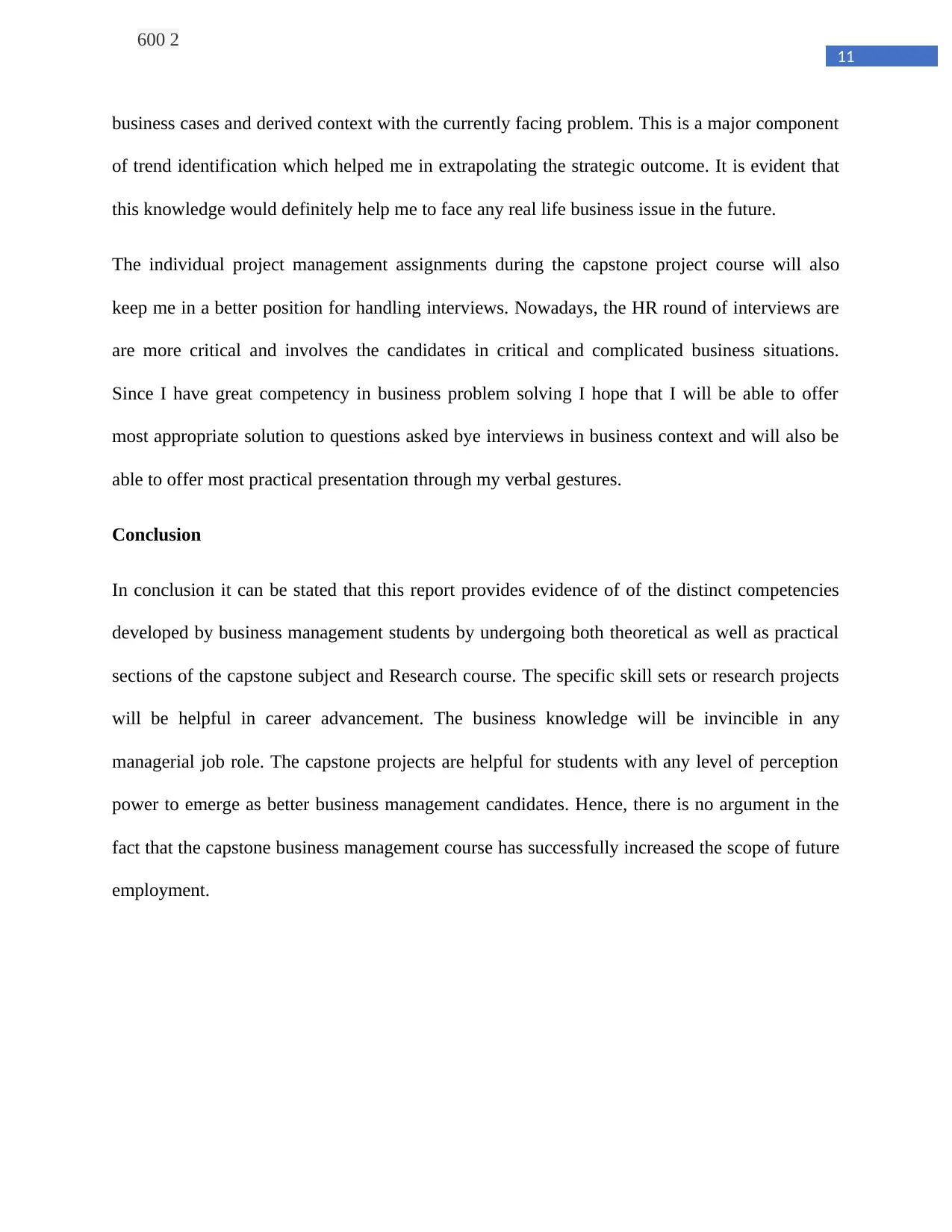
11
600 2
business cases and derived context with the currently facing problem. This is a major component
of trend identification which helped me in extrapolating the strategic outcome. It is evident that
this knowledge would definitely help me to face any real life business issue in the future.
The individual project management assignments during the capstone project course will also
keep me in a better position for handling interviews. Nowadays, the HR round of interviews are
are more critical and involves the candidates in critical and complicated business situations.
Since I have great competency in business problem solving I hope that I will be able to offer
most appropriate solution to questions asked bye interviews in business context and will also be
able to offer most practical presentation through my verbal gestures.
Conclusion
In conclusion it can be stated that this report provides evidence of of the distinct competencies
developed by business management students by undergoing both theoretical as well as practical
sections of the capstone subject and Research course. The specific skill sets or research projects
will be helpful in career advancement. The business knowledge will be invincible in any
managerial job role. The capstone projects are helpful for students with any level of perception
power to emerge as better business management candidates. Hence, there is no argument in the
fact that the capstone business management course has successfully increased the scope of future
employment.
600 2
business cases and derived context with the currently facing problem. This is a major component
of trend identification which helped me in extrapolating the strategic outcome. It is evident that
this knowledge would definitely help me to face any real life business issue in the future.
The individual project management assignments during the capstone project course will also
keep me in a better position for handling interviews. Nowadays, the HR round of interviews are
are more critical and involves the candidates in critical and complicated business situations.
Since I have great competency in business problem solving I hope that I will be able to offer
most appropriate solution to questions asked bye interviews in business context and will also be
able to offer most practical presentation through my verbal gestures.
Conclusion
In conclusion it can be stated that this report provides evidence of of the distinct competencies
developed by business management students by undergoing both theoretical as well as practical
sections of the capstone subject and Research course. The specific skill sets or research projects
will be helpful in career advancement. The business knowledge will be invincible in any
managerial job role. The capstone projects are helpful for students with any level of perception
power to emerge as better business management candidates. Hence, there is no argument in the
fact that the capstone business management course has successfully increased the scope of future
employment.
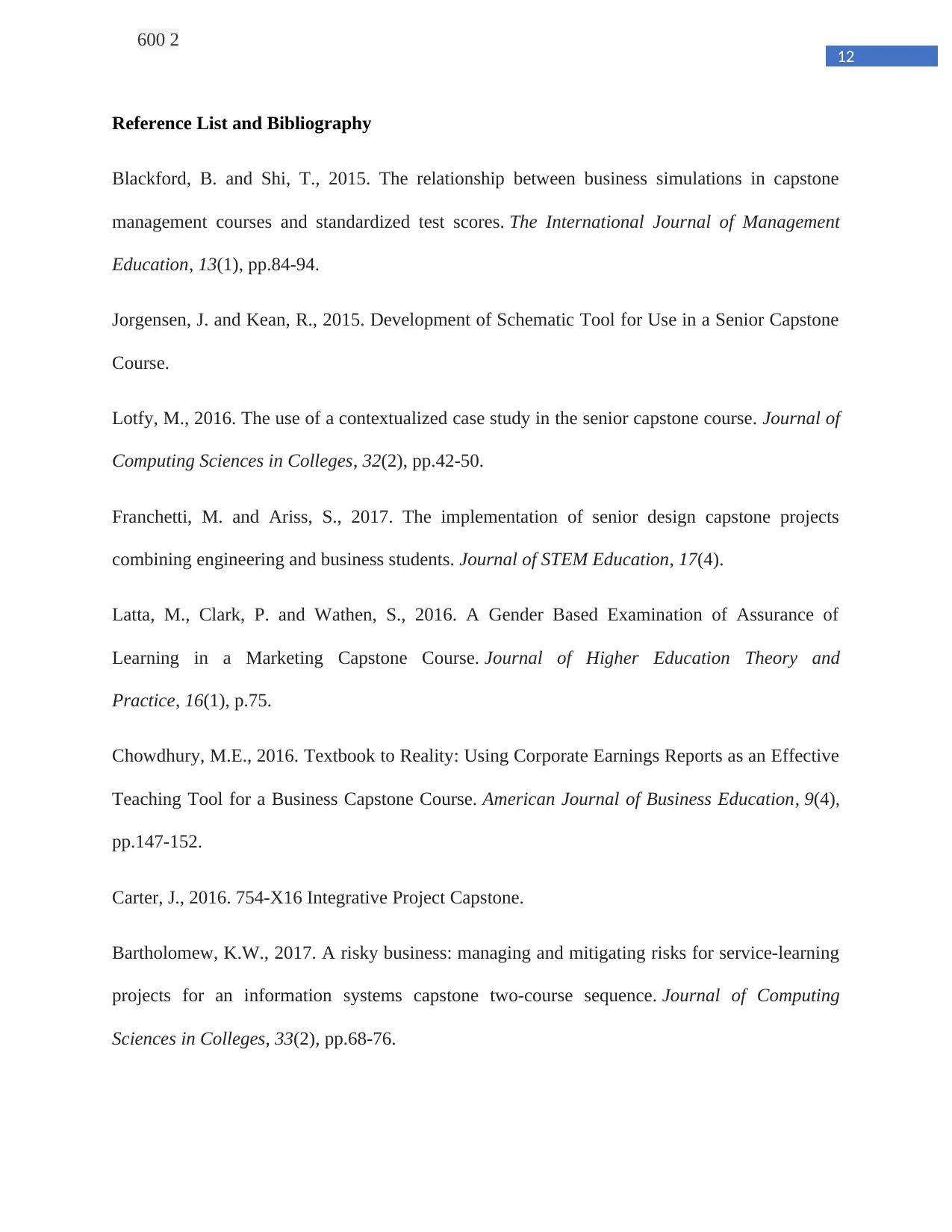
12
600 2
Reference List and Bibliography
Blackford, B. and Shi, T., 2015. The relationship between business simulations in capstone
management courses and standardized test scores. The International Journal of Management
Education, 13(1), pp.84-94.
Jorgensen, J. and Kean, R., 2015. Development of Schematic Tool for Use in a Senior Capstone
Course.
Lotfy, M., 2016. The use of a contextualized case study in the senior capstone course. Journal of
Computing Sciences in Colleges, 32(2), pp.42-50.
Franchetti, M. and Ariss, S., 2017. The implementation of senior design capstone projects
combining engineering and business students. Journal of STEM Education, 17(4).
Latta, M., Clark, P. and Wathen, S., 2016. A Gender Based Examination of Assurance of
Learning in a Marketing Capstone Course. Journal of Higher Education Theory and
Practice, 16(1), p.75.
Chowdhury, M.E., 2016. Textbook to Reality: Using Corporate Earnings Reports as an Effective
Teaching Tool for a Business Capstone Course. American Journal of Business Education, 9(4),
pp.147-152.
Carter, J., 2016. 754-X16 Integrative Project Capstone.
Bartholomew, K.W., 2017. A risky business: managing and mitigating risks for service-learning
projects for an information systems capstone two-course sequence. Journal of Computing
Sciences in Colleges, 33(2), pp.68-76.
600 2
Reference List and Bibliography
Blackford, B. and Shi, T., 2015. The relationship between business simulations in capstone
management courses and standardized test scores. The International Journal of Management
Education, 13(1), pp.84-94.
Jorgensen, J. and Kean, R., 2015. Development of Schematic Tool for Use in a Senior Capstone
Course.
Lotfy, M., 2016. The use of a contextualized case study in the senior capstone course. Journal of
Computing Sciences in Colleges, 32(2), pp.42-50.
Franchetti, M. and Ariss, S., 2017. The implementation of senior design capstone projects
combining engineering and business students. Journal of STEM Education, 17(4).
Latta, M., Clark, P. and Wathen, S., 2016. A Gender Based Examination of Assurance of
Learning in a Marketing Capstone Course. Journal of Higher Education Theory and
Practice, 16(1), p.75.
Chowdhury, M.E., 2016. Textbook to Reality: Using Corporate Earnings Reports as an Effective
Teaching Tool for a Business Capstone Course. American Journal of Business Education, 9(4),
pp.147-152.
Carter, J., 2016. 754-X16 Integrative Project Capstone.
Bartholomew, K.W., 2017. A risky business: managing and mitigating risks for service-learning
projects for an information systems capstone two-course sequence. Journal of Computing
Sciences in Colleges, 33(2), pp.68-76.
⊘ This is a preview!⊘
Do you want full access?
Subscribe today to unlock all pages.

Trusted by 1+ million students worldwide
1 out of 13
Related Documents
Your All-in-One AI-Powered Toolkit for Academic Success.
+13062052269
info@desklib.com
Available 24*7 on WhatsApp / Email
![[object Object]](/_next/static/media/star-bottom.7253800d.svg)
Unlock your academic potential
Copyright © 2020–2026 A2Z Services. All Rights Reserved. Developed and managed by ZUCOL.



